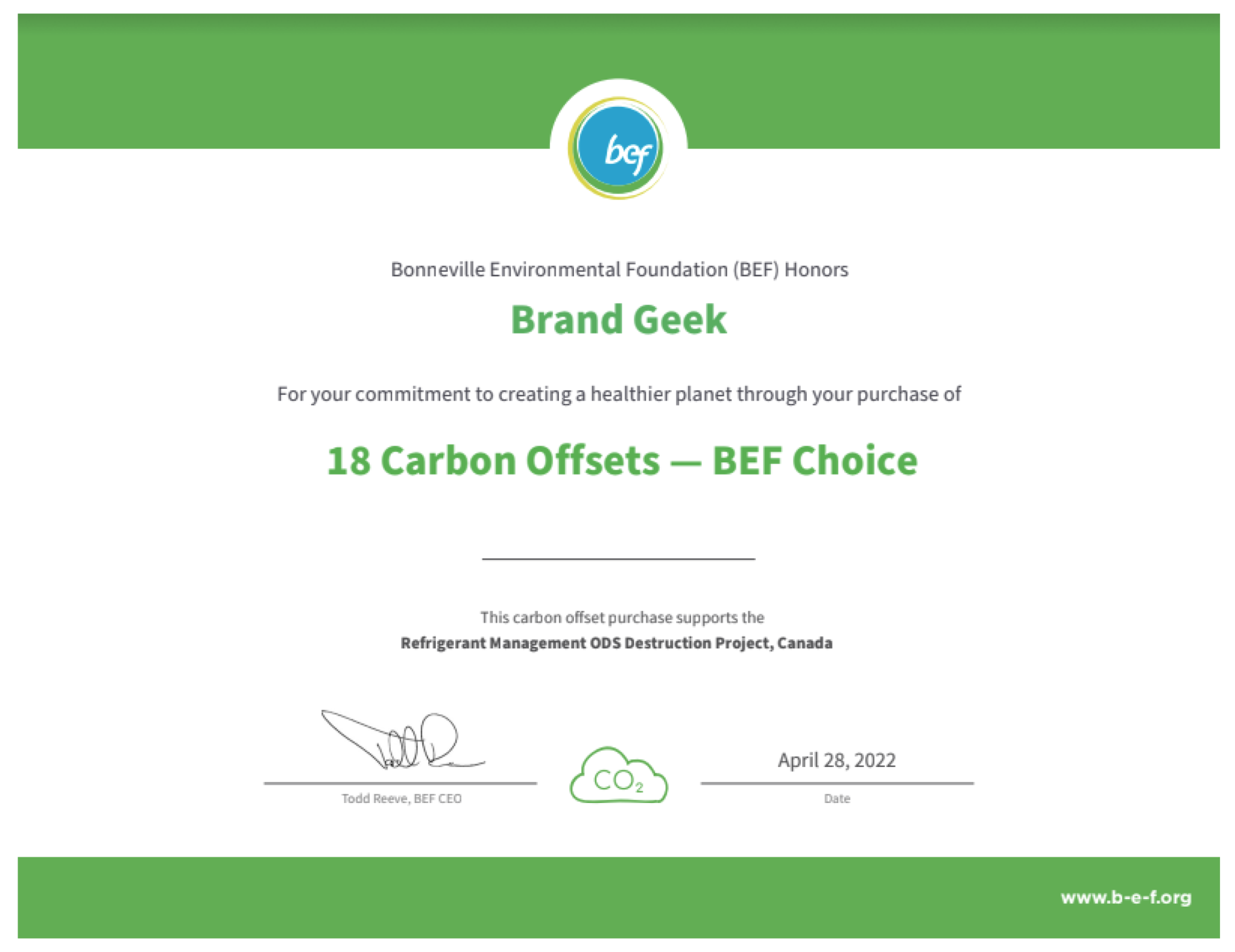Brandgeek proudly supports Mountain Area Preservation and is humbled to be…
EcoAd Under Fire for Greenwashing
Last week I received the following e-mail:
[framed_box]Hi Lara,
Please forgive the cold email, but I found your organization on the LOHAS site and truly appreciate the effort that you put forth with sustainable brands, I felt like someone as in-touch as you would want to know of a seachange in advertising! I would honor the opportunity to tell you about the amazing new division that we have launched at CBS. It’s called EcoMedia and we are just rolling this program out regionally (and nationally).
Simply put… EcoMedia now puts a percentage of marketing dollars to work in local communities by funding underfunded environmental projects, which create jobs and saves taxpayer money and of course cleans our communities. Imagine, advertising that helps our environment, about time, right?
I don’t know if you ever recommend advertising or marketing ideas to your clients, but I would appreciate it, EcoMedia certainly seems to align with your clients goals. There is more to tell, so I’ve included information about our EcoAd program which puts advertising dollars to work in a whole new way. Also, the website is: www.ecomediacbs.com, specifically check out the “Find Out More” section, it’s a great video snapshot of the program.
I would love to review the details with you and get your take, and perhaps we can do some great things together.
Please feel free to call me if you have any initial questions. Maybe we can schedule a call for early next week to discuss? Thank you so much for your time and consideration.
(Name removed)
EcoMedia Specialist
EcoMedia
A CBS Company
[/framed_box]So, what is this all about? What’s CBS doing e-mailing me about advertising? (Don’t they know I don’t have TV and consciously ignore billboards?!?!)
According to USPTO records, ECOMEDIA has been in use since at least as early as December 31, 2005 for “advertising and advertisement services; advertising and promotion services and related consulting, namely, promoting the products and services of third parties through sponsoring arrangements;” and “raising funds for environmental clean up and conservation and environmental education.” On August 18, 2010, EcoMedia, LLC and CBS EcoMedia, Inc. (then operating under the name Stargate Acquistion Group) executed a nunc pro tunc trademark assignment of the ECOMEDIA mark. On July 21, 2010, CBS EcoMedia filed three trademark registration applications for ECOAD for media & advertising services, charitable fundraising, and educational services. On November 23, 2010 CBS filed 3 more trademark registration applications for the ECOAD composite mark (words & design — shown above) for media services, fundraising, and educational services.
According to the CBS EcoMedia website, Paul Polizzito founded EcoMedia in 2002 to “harness the untapped power of advertising and channel it into tangible, positive environmental change.” (Sounds noble enough.) The website continues:
[framed_box]For the past eight years, EcoMedia has directed millions of advertising dollars into green school makeovers, municipal energy retrofits, urban reforestation projects, solar installations at city halls and airports, and cleaner urban waterways.
Our efforts have not gone unnoticed. In 2009, we were recognized by the United States Conference of Mayors and given an Award for Excellence in Public/Private Partnerships.
And then things got bigger and better.
In 2010, our acquisition by CBS gave us the opportunity to bring our sustainable media model to a much larger scale, giving us the reach to do more, help more, and be more. Now, EcoMedia is proud to offer advertisers our newest sustainable media product, a trademarked concept solely ours: the EcoAd.[/framed_box]
What EcoMedia’s website fails to mention is that the ECOAD program has come under fire for greenwashing. On January 11, 2011, Ecopreneurist issued a Greenwash Alert for CBS’ EcoAds, which argued that having enough money to advertise with CBS is insufficient criteria for what makes an ad “eco.” (No doubt!) Simply because some portion of the revenue from each EcoAd package funds critical enviro projects, doesn’t make the ad (or by implication, the advertiser) “eco.”
The folks at Ecopreneurist felt so strongly about this that they, along with Center for Environmental Health, Rainforest Action Network and Friends of the Earth, sent a letter to the FTC on April 11, 2011 requesting that the FTC investigate the CBS EcoMedia EcoAd program. Essentially, the concerned non-profits and Ecopreneurist want CBS to provide more context around its EcoAds. Currently, consumers see a green leaf and the text EcoAd in connection with ads purchased under the EcoAd program. However, there is nothing to substantiate advertisers’ or their products’ environmental attributes or to explain the true criteria of the EcoAds to the consumer. The group asserts that this conduct violates Section 5 of the FTC Act and the FTC’s Green Guides and its proposed revisions (about which I wrote here). Ultimately, the group asks that the FTC:
[framed_box]1. Investigate the CBS‐EcoMedia EcoAd program for compliance with Section 5 of the FTC Act and the FTC Green Guides;
2. Issue a warning to CBS‐EcoMedia outlining the deficiencies in the EcoAd program; and
3. Suggest revisions to the EcoAd program, including:
a. The addition of text accompanying any use of the EcoAd symbol by advertisers, to clearly and prominently alert viewers that the symbol does not
specify any positive environmental attributes of companies or products advertised;
b. Development of criteria for evaluating advertisers and products for participation in the EcoAd program, including publication, public comment, and
revisions based on comments; and
c. Oversight by an independent, third‐party auditor that can verify whether companies or products seeking to use the EcoAd symbol meet the criteria.[/framed_box]
It will be interesting to see what comes of this request. While the FTC actively enforced the Green Guides from 1990-2000, it appears to have heard only a few cases in 2009 and issued only warning letters in 2010. Nonetheless, as we anticipate the release of the revised Green Guides, I presume the FTC will be under pressure to take action to enforce the Guides and this matter may be the first test of its resolve to protect consumers against greenwashing.
 Truth in advertising is becoming increasingly important. Your competitors aren’t the only ones who are watching how you market your goods/services; as the EcoAd case exemplifies, non-profits and the media also may take you to task if they think you’re engaging in deceptive advertising.
Truth in advertising is becoming increasingly important. Your competitors aren’t the only ones who are watching how you market your goods/services; as the EcoAd case exemplifies, non-profits and the media also may take you to task if they think you’re engaging in deceptive advertising.





Comments (0)